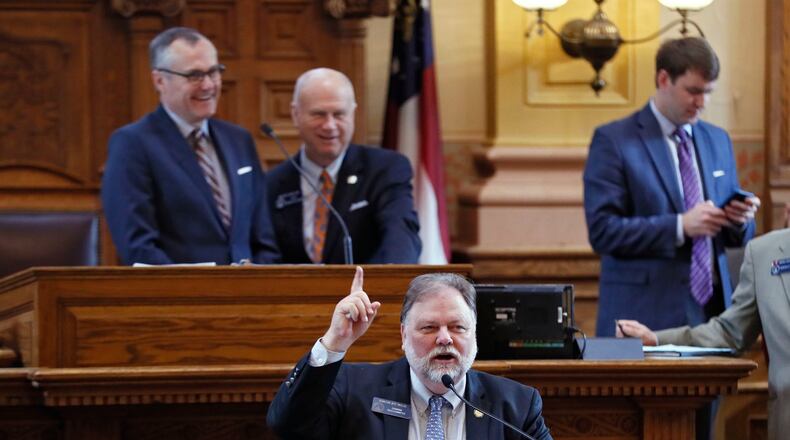To the sounds of James Brown's "I Feel Good," the hardest working man in the state Senate, Rules Chairman Jeff Mullis, entered Room 450 of the Capitol on Monday, ready to dispense life or death on legislation for the 2018 session.
Two hours later, most of the 40 or so House members who’d asked for their bills to be considered on the final two days of the legislative session left feeling pretty darn good as well.
“We have 101 bills to consider,” Mullis said as he began the final meeting of this session of the Senate Rules Committee, which sets the calendar for his chamber. “Not every one of these is going to make it even though each is an outstanding piece of legislation.”
Mullis is usually on the receiving end of buttering up from House members, but then again, the opposite chamber has yet to decide its final cut of Senate bills.
As each legislative session nears its finale — this one is supposed to end Thursday night — the House and Senate Rules committees become increasingly important because they decide what their chambers get to vote on.
Each year groveling lawmakers line the walls of the House and Senate Rules meetings, waiting to present their bill for consideration. Well-paid advocates jam the rooms to keep an eye on legislation they are supporting or hoping to kill.
It wouldn’t be a legislative session without at least some of the most important or controversial bills going down to the wire. Purposeful procrastination is as much a part of lawmaking at the Capitol as lobbyists picking up the check for lunch and dinner.
The two chambers treat the setting of the final calendar of bills differently. While the House Rules Committee will sometimes hold quickly called meetings a few hours before the session ends to add bills for consideration, the Senate sets a calendar a day or two ahead of time.
A natural-born wisecracker, Mullis typically puts on a show, complete with entrance music and hand-shaking as he makes his way through the crowd, mimicking a presidential candidate or a prizefighter heading to the ring.
He allows House members to come before the committee, one by one, to ask that their bills be given a spot on the Senate calendar for the 39th and 40th days of the session.
Some just mention the bill number and are gone in less than 30 seconds. Others, such as state Rep. Paul Battles, R-Cartersville, whose House Bill 624 would increase legislative pensions, are asked to explain their bill a little.
State Rep. Scot Turner, R-Holly Springs, seemed to have a sure-fire pitch to senators, who must face voters this fall.
“I bring you four bills designed to get you all re-elected,” Turner told members of the committee.
Mullis responded: “I appreciate the comment about wanting us all to get re-elected. None of us are here for that. All of us are here to choose the best bills for the people of Georgia.”
Mullis got a few snickers, and Turner went 0-4, although some of his bills might be attached to other legislation ready to move through the chamber.
At least two House members uttered the time-honored phrase guaranteed to earn a favorable nod from lawmakers: Their bills, they said, "are for the children."
Other mentioned their impending retirement from the General Assembly (Translation: Please give me a going-away present.).
State Rep. Bill Hitchens, R-Rincon, tried a novel approach, elevating Mullis by starting his sales pitch saying, "Thank you, Mr. Speaker."
The speaker leads the Georgia House and, by the way, is paid a full-time salary, unlike other lawmakers, including those on the Senate Rules Committee.
“Did you just call me Mr. Speaker?” Mullis asked.
A sheepish Hitchens responded, “I say it so often.”
After hearing from House members, Mullis went a few rounds through his committee members as they picked bills to make the list. On two occasions he suspended the meeting to huddle with Senate President Pro Tem Butch Miller, R-Gainesville, and Senate Majority Leader Bill Cowsert, R-Athens. Then new rounds of bills made the grade.
At one point, Mullis spotted two committee members whispering and, in a mock admonishing tone, remarked: “You know my policy. I am against any conspiracy I am not a part of.”
After about two hours, Mullis adjourned the meeting, with his committee having approved 80 House bills and resolutions for a vote on the Senate calendar for the final two days of the session.
Since they’d clearly worked up an appetite, Mullis invited lawmakers to a room next door for lunch, brought to them by lobbying firms who had been represented in the room and special-interest associations for hospitals, new-car dealers, county commissioners, the hotel and oil industries, telecommunications firms, and doctors.
About the Author
Keep Reading
The Latest
Featured


